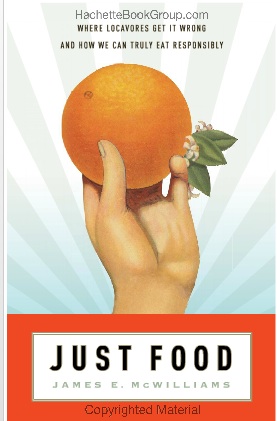
(Photo: The cover of Just Food, a new book by Texas State Professor James McWilliams on sustainability in eating and farming)
By Julie Thibodeaux
James McWilliams didn’t set out to become an activist for ethical eating. An associate professor of history at Texas State University in San Marcos with a PhD from Johns Hopkins University, he was engrossed in the history of agriculture when his path took an unexpected turn.
“It became apparent that the production of food is connected to serious ethical questions,” he said. “It became very hard to stay out of contemporary issues.”
Living in Austin, where foodies and environmentalists abound, he often found himself caught up in heated discussions about food production that touched on global warming, fossil fuels, water quality, pollution and animal welfare.
Drawing on his training as an undergraduate philosophy major, he decided to devote his personal writing to contemporary issues rather than following the path of a traditional historian.
The result has been his latest book, “Just Food: Where Locavores Get it Wrong and How We Can Truly Eat Responsibly.” 
In his book, McWilliams takes on popular stances about food issues and debates their wisdom. While buying local, eating organic and boycotting genetically modified foods has become the credo of environmentalists, he found in his research reason to question those assumptions.
(Photo: Professor James McWilliams in Austin)
At times alienating both traditional and organic farming advocates, McWilliams said he’s come to believe there are some instances where the use of synthetic chemicals and biotechnology can be justified. For example, reducing tillage has been discovered to be an effective way to keep the soil healthy, enhance water quality, lessen fertilizer usage, increase biodiversity and reduce greenhouse gas emissions. However, its success depends on using crops that are genetically modified to be herbicide-resistant along with Monsanto’s Roundup, what he refers to as a low-risk herbicide. Conversely, he discovered some organic farmers use “natural” chemicals he considers questionable, such as sodium nitrate and copper sulfate, which can pollute groundwater and soil with harmful effects.
He concludes that the consumer standing in the grocery store can’t make truly ethical choices without more detailed standardized labeling.
“The problem with our food system is we don’t have enough information to make these decisions. I’m not a chemist. I’m not a toxicologist. One thing I would really like to know is how far is the farm from a coal-fired plant? How close was the produce grown to a petro-chemical facility? Because it’s very common for industrial plants to produce toxins that leave a residue on surrounding sites.”
Like many consumers, McWilliams finds himself purchasing a mixture of organic and traditional, along with local and shipped-in produce.
“None of us are completely rational consumers,” he said. “I do buy organic blueberries because I know the chemicals they use on traditional farms are very toxic. I buy organic peaches because it’s hard to wash the pesticides off them. But mangos, apples and lettuces, I don’t worry about too much.”
As for buying local, McWilliams said food miles matter but not to the extent of other factors such as the energy cost of making food, which he said greatly exceeds the energy used in transportation. He also added that some arid regions are simply not conducive to growing produce while others lend themselves to large production.
“I buy local when it makes sense to do so,” he said.
While McWillams said many issues regarding the food industry are blurred, he takes a strong stand when it comes to meat consumption. While the average American consumes more than 200 pounds of meat a year, he advocates radically reducing that amount to about 12 pounds a year -- or less if possible.
“If you want to reduce your carbon footprint, the single most important decision you can make is to stop eating meat.”
He reasons that producing meat requires vast amounts of acreage, feed and fertilizer. It contributes to land degradation, pollution, global warming not to mention animal suffering.
And while he said it’s admirable for consumers to seek meat, eggs and dairy products that are cruelty-free, McWilliams said products labeled cage-free, free-range and organic are designed to ease the consciousness of the consumer and are often deliberately misleading. They’re no guarantee inhumane practices weren’t permitted.
“The question I would ask -- is it ever not cruel to raise an animal and kill it for food?” said McWilliams philosophically. ”It’s double-speak. Killing an animal is not conducive to its welfare.”
Since writing “Just Food,” animal agriculture has become central to McWilliams’ writing. He is currently working on two books -- one about the origins of factory farming and a second about the history of meat-eating and the importance of switching to a plant-based diet.
He said he’s been surprised where his research has led him in recent years but chalks it up to being open to new realizations. He said it’s resulted in positive changes in his life.
“If you would have asked me in my 20s -- do you think you’d become a vegan animal advocate in 10 years, I would have said you’re completely crazy.”
For more information on McWilliams, see http://james-mcwilliams.com.
Julie Thibodeaux is a Fort Worth-based writer covering environmental issues, green topics and sustainable living. Previously, she worked as an editor and writer at the Fort Worth Star-Telegram. Contact her at julie@jthibodeaux.com









